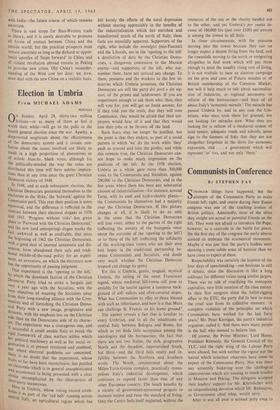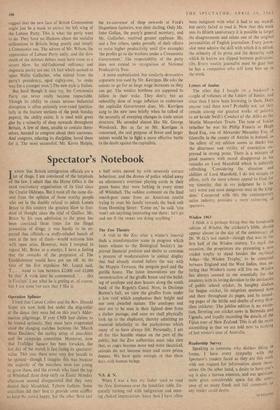Communists in Conference
By STEPHEN FAY
STRANGER things have happened, but the attempts of the Communist Party to make friends left, right, and centre during their Easter congress was one of the touching ironies of British politics. Admittedly, most of the allies they sought are actual or potential friends on the left. They were not afraid to introduce the Pope, however, as a comrade in the battle for peace. On the first day of the congress the party almost seemed to embrace the ecumenical movement, Maybe it was just that the party's leaders were showing a more subtle sense of humour than we have come to expect of them.
Respectability was certainly the keynote of the four days of speechmaking— one hesitates to call it debate, since the discussion is like a long soliloquy for different voices using similar jargon. There was no talk of crucifying the monopoly capitalists, very little mention of the class enemy. In their first congress since the ballot-rigging affair in the ETU, the party did its best to erase the cruel scar from its collective memory. 'A complete violation of the principles on which Communists have worked for the last forty years,' Mr. Peter Kerrigan, the party's industrial organiser, called it. And there were many people in the hall who seemed to believe him.
Of course, the Prime Minister, Lord Home, President Kennedy, the General Council of the TUC, and the right wing of the Labour Party were abused, but with neither the vigour nor the hatred which armchair observers have come to expect of the Communist Party. Nor was there any unseemly bickering over the ideological controversies which are causing so much trouble in Moscow and Peking. The delegates accepted their leaders' support for Mr. Khrushchev with an unquestioning devotion which Mr. Redmayne, as Government chief whip, would envy.
After it was all over it seemed petty even to
suggest that the new face of British Communism might just be a mask to attract the left wing of the Labour Party. This is what the party want to do. They have no illusions about the socialist millennium in Britain being purely and simply a Communist one. The advent of Mr. Wilson, the appearance of Labour Party unity, and the slow death of the defence debate must have come as a severe blow. So old-fashioned militancy and dogmatic purity are out. (A fact which seemed to upset Willie Gallacher, who retired from the party's presidency, aged eighty-one, 'to make way for a younger man.') The new style is Italian.
But hard though it may try, the Communist Party can never really become respectable. Though its ability to create serious industrial disruption is often seriously over-rated (particu- larly in the feature sections of the posh Sunday papers), the ability exists. It is used with great glee by a minority of shop stewards throughout Britain. A few of them, unable to contain them- selves, boasted to congress about their successes. And congress, relaxing its discipline, loved them for it. The most successful, Mr. Kevin Halpin, the ex-convenor of shop stewards at Ford's Dagenham factories, was their darling. Only Mr. John Gollan, the party's general secretary, and Mr. Gallacher, received greater applause. He, and a few others, spoke proudly of their efforts to resist higher productivity until (for example) `the profits go to the workers under a Communist Government.' The respectability of the party does not extend to recognition of National Productivity Year.
A more sophisticated, but similarly destructive argument was used by Mr. Kerrigan. He asks the unions to go for as large wage increases as they can get. The weaker brethren are supposed to follow in their wake. They don't; but an unhealthy dose of wage inflation to embarrass the capitalist Government does. Mr. Kerrigan sang to the new tune briefly when he talked of the necessity of sweeping changes in trade union structure. He sounded almost like Mr. George Woodcock. But as far as Mr. Kerrigan is concerned, the real purpose of fewer and larger unions would be to fight a more effective battle to the death against the capitalists.



































 Previous page
Previous page